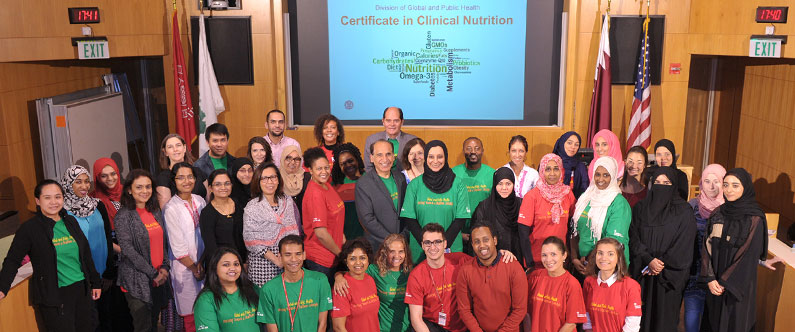Plaudits for inaugural WCM-Q nutrition course
 All attendees who completed the course were awarded the Certificate in Clinical Nutrition.
All attendees who completed the course were awarded the Certificate in Clinical Nutrition.
A team of local and international experts in nutrition shared recent trends and the latest research into the impact of diet on health on a new course offered by Weill Cornell Medicine-Qatar (WCM-Q).
Organized by WCM-Q’s Division of Global and Public Health, the 50-hour intensive Certificate in Clinical Nutrition Course gave 51 healthcare professionals, educators, researchers and dieticians in attendance enhanced knowledge of key issues relating to nutrition and health.
Through a series of presentations, discussions and workshops, participants learned about the impact on health of popular nutritional and herbal supplements, elimination and anti-inflammation diets, Mediterranean-style dietary habits, veganism and vegetarianism, and the role of nutrition in the causation and management of chronic conditions such as obesity, cancer and diabetes.
Dr. Ravinder Mamtani, Associate Dean for Global and Public Health and course director, said:
“When conceptualizing the course our attention was drawn to two noteworthy observations. One, even today, very few healthcare professional schools around the world provide adequate instruction in nutrition and lifestyle medicine to their students. For example, a 2014 study in The American Journal of Medicine cited a survey of medical schools that found an average of fewer than 20 hours over four years devoted to nutrition education.
Two, there is overwhelming evidence that unhealthy food choices are linked to many chronic diseases such as diabetes, heart disease and obesity. Therefore, ignoring nutrition in our evaluation and management of our patients or clients is simply not an option.”
The WCM-Q course gives detailed instructions on how to plan healthy nutrition regimens for all types of individuals, including children, pregnant and lactating women, and the elderly. All attendees who completed the course, which was held on four consecutive Saturdays, were awarded the Certificate in Clinical Nutrition.
Dr. Sohaila Cheema, Director of Global and Public Health and course director, said:
“We all know that good nutrition is crucial to good health, but there is a vast amount of conflicting information available, which can be confusing for healthcare consumers. Our aim with the Certificate in Clinical Nutrition is to offer clear, consistent and accurate nutritional advice that can be applied to a wide range of people and situations, backed up by strong scientific evidence.”
Dr. Mamtani gave presentations on the role of micronutrients, how to define what constitutes a healthy diet, how to tailor nutrition to specific health conditions, and the key characteristics of popular diets such as the Mediterranean and low carbohydrate diets. He also discussed specific clinical cases in which nutrition, along with appropriate clinical care, played a predominant role in the treatment of individuals. Dr. Cheema provided participants with information regarding practical tips on making healthy choices while shopping and eating for optimal health.
Dr. Albert Lowenfels, Professor of Community and Preventive Medicine at New York Medical College Valhalla, New York, presented on nutrition and cancer, and Dr. Benjamin Kligler, Vice Chair and Research Director of the Department of Integrative Medicine at the Continuum Center for Health and Healing in New York, spoke about the benefits and risks of various herbal and nutritional supplements.
Other presenters included WCM-Q’s Dr. Rayaz Malik, Professor of Medicine; Dr. Shahrad Taheri, Professor of Medicine and Director of the Clinical Research Core; Dr. Mohamud Verjee, Associate Professor of Family Medicine; Dr. Moncef Ladjimi, Professor of Biochemistry; Dr. Badreldeen Ahmed, Professor of Clinical Obstetrics and Gynecology at WCM-Q and Director of the Feto Maternal Center; and Dr. Amal Khidir, Assistant Professor of Pediatrics.
The other presenters were Dr. David Reilly, Consultant Physician at the NHS Centre of Integrative Care in Glasgow, Scotland, and Dr. Mohammed Ilyas Khan, Lactation Consultant and Maternal and Child Health Specialist at Hamad Medical Corporation’s Al Khor Hospital.
In total, the course consisted of 32 hours of direct, on-site contact at WCM-Q and a further 18 hours of self-study using online course materials.
Course participant Dr. Rasmeh Ali Salameh Al Huneiti, Research Training and Education Specialist in the Health Care Quality Management and Patient Safety Department at the Ministry of Public Health, said: “I was pleased to attend the Certificate in Clinical Nutrition Course, because for me it went the extra mile beyond traditional training. It was a fantastic experience of knowledge-sharing through interaction with colleagues, meeting with scholars, experts and scientists.”